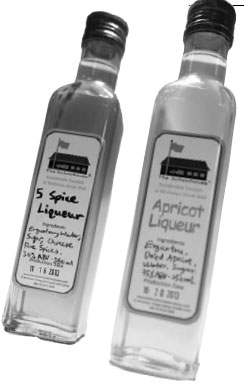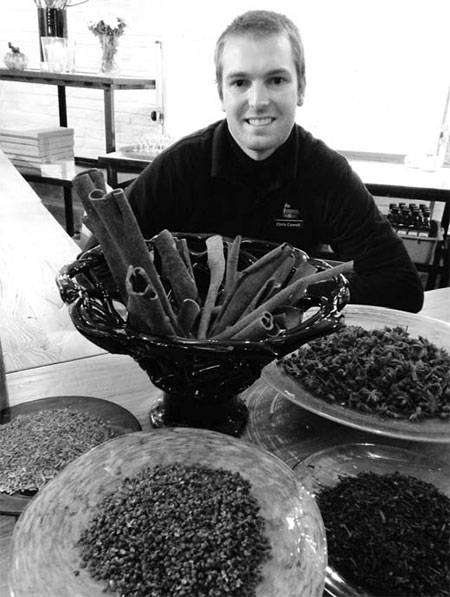Raising a stink
Updated: 2014-01-26 07:22
By Mike Peters(China Daily)
|
|||||||
A young American's enthusiasm for vinegar has made him a new China hand quickly, he tells Mike Peters.
For first-timers in China, coping with an alien culture is a challenge magnified by the language-barrier. But a young US horticulture graduate last year quickly found two common denominators. The first one: Snow. "Last winter, when I was first getting accustomed to living out here, we had some very memorable snowball fights," recalls Chris Cowell, laughing. "That led me to really meet and interact with a lot of my colleagues that I couldn't really speak to at the time due to the language barrier." The second connection he found with Chinese was vinegar, which Cowell has been brewing since his arrival in suburban Beijing.
He's working as an intern at The Schoolhouse at Mutianyu, a family-owned sustainable tourism business underneath the Great Wall. The complex includes a restaurant, lodging, a glass-blowing studio and an orchard - where Cowell has found his niche coaching the staff to make vinegars and liqueurs from the fruits of the field.
"During the first spring I spent here," he remembers, "we took a business-research trip to Taiyuan, which really opened my eyes to the impact of vinegar in China. We were able to see massive lines of people waiting to purchase their vinegar from what most likely is the oldest vinegar company still around today, Ninghua Fu vinegar, which claims to be more than 638 years old."
Growing up on Washington state's San Juan Islands in the US Northwest, Cowell says his love for the natural environment probably stems from having instant access to many remote, semi-undisturbed places. That passion, plus an interest in gardening and permaculture, made his ultimate major at the University of Washington a natural: environmental science and resource management.
A friend of his mother's asked about him soon after graduation. When she learned what Cowell had been studying, she remembered her friends Jim Spear and his wife, Liang Tang, the managing partners of The Schoolhouse, an eco-retreat that has become a local leader in the Slow Food movement. She urged Cowell to join them for a season as an intern. Cowell was successful in gaining an internship there and headed for Beijing in December 2012. "After a few meetings, we began discussing my interest in vinegars," he says, and soon a product line that would also include liqueurs began to take shape.
"In the San Juan Islands, like much of the Northwest, there is an overabundance of the Himalayan blackberry. (When I was young) my parents would use these 'berries' to make alcohol infusions, among other delicious food concoctions."
"Chris is a self-starter and really reliable," says Schoolhouse co-founder Spear. "He has been a tremendous asset, including as a host, sharing what he's made with guests." At the recent holiday dinners that have become a trademark of the resort, Cowell was front-and-center with his line-up of liqueurs, offering samples and snappy patter as guests sipped his bottled Erguotou concoctions, including infusions of apricot, hawthorn, Yunnan coffee, and an exquisitely balanced five-spice blend.

"We are already using our own vinegars for salad dressings for special occasions," says Spear. "Going forward, all of our Western salad dressings will use our own vinegar. Later this year we will be offering vinegar coolers (vinegar and soda water on ice with simple syrup to sweeten them) as well as vinegar sorbets and other specialty products."
Cowell gives tours of the new orchard facilities, including temperature-controlled aging rooms, bottling and packaging room, formulation and mixing room - and a room for complimentary tasting.
"From these tours you are able to see how the liqueurs are made and bottled," he says. "We can also bring guests into our small, artisanal, vinegar fermentation room, where I can give step-by-step explanations."
Spear points out that the new fruit-based products are designed to help sustain agriculture in the surrounding community.
"The orchard land itself was mainly planted with chestnut when we acquired it," he says. "We are changing the mix of trees and it will take several years for the new trees to bear. However, our goal has never been to obtain most of the fruit from our own orchard. Rather, we want to purchase from our local neighbors who meet our standards. For our current products, some have been made with our own fruits but most have been obtained from local producers and vendors."
Vinegars made from pears and red wine will be the first into bottles, Cowell says, because the ingredients are plentiful.
"A lot of specialty vinegars are pasteurized wine vinegars with added flavors," Cowell says, "but we are trying to make vinegars directly from the fruits being juiced and fermented. This makes these products more season-dependent, but the results have more nutritional value. We are also keeping our vinegars 'alive', by not pasteurizing them, since pasteurization results in killing all of the healthy bacteria for which vinegar is acclaimed."
Cowell and his team know that doing good won't excite customers at The Schoolhouse or at upcoming farmers' markets if what they produce doesn't taste good, too. Based on the way dinner guests over Thanksgiving, Christmas and New Year's were scooping up the 100-yuan bottles of liqueur after sampling the goods, Cowell seems confident that base is covered, too.
Contact the writer at michaelpeters@chinadaily.com.cn.
|
The components of traditional Chinese "five spice" mix inspires one of Chris Cowell's creations. Photos by Mike Peters / China Daily |
(China Daily 01/26/2014 page5)
